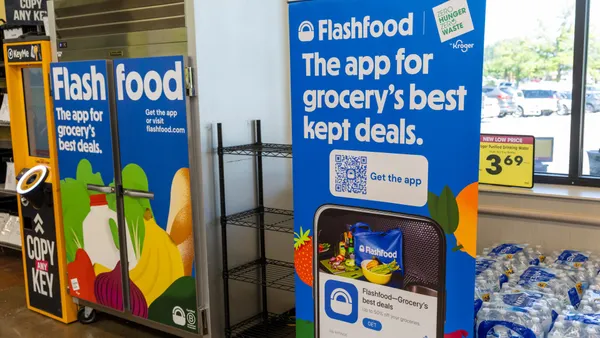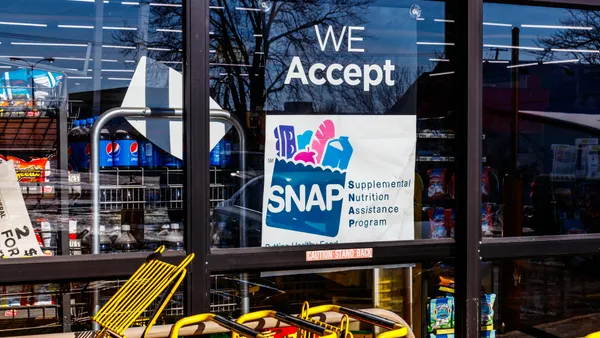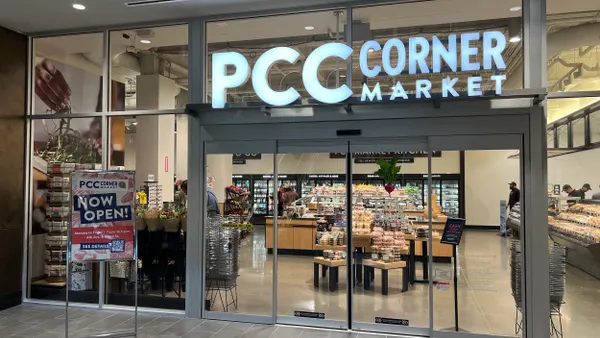Dive Brief:
- As the holiday season gets underway, 45% of surveyed shoppers are worried about rising prices for holiday meals and celebrations, according to a new report from the Food Industry Association (FMI).
- Inflationary concerns have largely replaced safety worries about COVID-19, the report found, but out-of-stocks continue to be a big worry for shoppers. The same percentage of respondents compared to a year ago (58%) said food shortages around the holidays remain a concern.
- FMI found more customers are planning to shop earlier than usual for Thanksgiving and for December holidays, partly driven by a desire to avoid out-of-stocks with their favorite holiday foods.
Dive Insight:
With holiday festivities around the corner, FMI’s report found fewer surveyed shoppers expect COVID-19 to impact their celebrations.
Thirty-eight percent of respondents in October said they are very or extremely worried about COVID-19, down from 48% who said the same in August. The report, which is the sixth installment of FMI’s U.S. Grocery Shopping Trends series, is based on a survey of 1,718 U.S. adults conducted from Oct. 1-6 and findings from 14 prior surveys, ranging from 1,001 to 2,091 respondents each.
More than two-thirds of survey participants said they will engage with the holidays "about the same" as last year, FMI found. Shoppers said they generally plan to get together with more people, travel more and shop earlier than usual to a greater degree this year than they did last year, but are still worried about high food and gas prices and out-of-stocks, the report noted.
In September, food-at-home prices increased 13% year-over-year while the overall inflation rate moved up 8.2% compared to the same period in 2021— continuing months-long highs for both figures.
The average weekly grocery basket spend per household was highest for the six-day period at the start of October ($148) compared to approximately the same period last year ($144) and in 2020 ($146). Of the 62% of households that reported increasing their weekly grocery spending over the past year, 85% claimed their larger grocery bills were due to higher prices, FMI found.
For missing favorite items, FMI discovered which strategies customers will turn to: 50% said they will try preparing something different than they have in the past, while 36% said they will look for a new recipe and 23% said they will keep their plans without any substitutions.
As for cost concerns, respondents reported more fragmented preferences to cope like looking for deals or sales (28%), buying more store brands (21%) and preparing more at-home dishes (20%).
For both Thanksgiving and holidays in December, including Christmas, Hanukkah and Kwanzaa, an uptick in consumers who say they’ll prepare further in advance is a key takeaway, per the report. Thirty-seven percent of respondents said they will up shop further in advance than usual for Thanksgiving, up 4 percentage points from 2021, while 34% said the same for the December holidays, up 6 percentage points.
For Thanksgiving, people are more likely to cook than rely on food from restaurants or the prepared food section.
The report also looked at online grocery shopping behavior and found that, while it has remained elevated compared with pre-pandemic levels, grocery e-commerce has started to dip since the summer. The frequency of online grocery shopping dipped 3 percentage points and 4 percentage points, respectively, for people who said they shopped online “at least occasionally” and “almost every time.”
Weekly online grocery spending as a share of total grocery spending dipped from 24% in August to 19% in October. Meanwhile, the share of shoppers who have an online source as their primary store declined to 4% in October, down from 7% in August and 6% in February.












